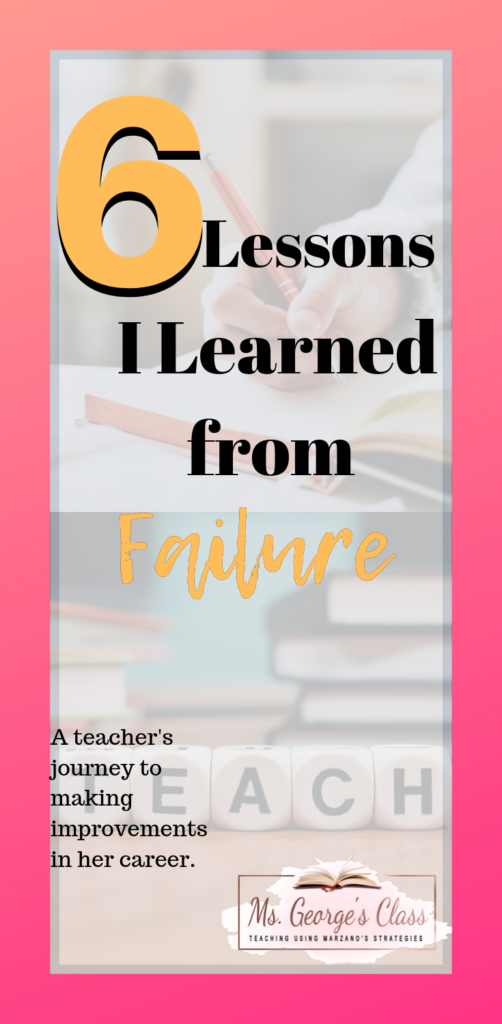
Failure can feel like a dark cloud over your life; however, it can bring with it a valuable lesson. I was feeling good about myself. I had earned accomplished on my teacher evaluation, and I earned Master Teacher status the same year. At the end of the school year, I took a chance and transferred to my district’s high performing middle/high school. I was also transferring from teaching middle school to tenth grade. I taught tenth grade for nearly ten years, and I felt very confident. Once the transfer happened, failure was present, and my life turned upside down.
I was happy about my transfer, but I soon realized the change would be overwhelming. The English department chair and teacher leader had a meeting with me. They instructed that I was only to use the SpringBoard Worktext, and I could not use my novels (which were stored in my garage). The students had a summer reading assignment, and I had to read the novels to be prepared for the first week of school. I was stressed, but I accepted the task.
Valuable Lessons I Learned
1. Change is Hard– Working at the new high school was very challenging. I remember, during a staff meeting, the principal stated that new teachers were put through a hazing process from the students. I missed my old school; I had worked there for fourteen years. During one lesson about different culture environments, I compared my old school to my new school. Not a good idea. While talking with other teachers, I caught myself saying, “Well, at my old school, we did this…” Making those statements did not help gain rapport with students. Students told me that they were trying to get me fired, and they were building a case against me with the principal. I met with the principal, and she had several copies of the students’ work. Parents called and questioned assignments that were from the textbook. I was in shock and tried to defend myself, but nothing worked.
2. My Teacher Toolbox Did Not Work-My toolbox included my discipline style and daily agenda. My discipline style included a warning, call home, and an office referral. I was giving warnings about phones and minor class disruptions. I called home and kept documentation of the phone calls. I wrote office referrals, but students continued to misbehave. In the past, I was praised for posting my daily agenda, today’s objective, and lesson plans on the board. However, students complained about not knowing what they were learning every day. This was the most frustrating.
3. Make Improvements Where Needed– I listened to the help from the principal, department chairperson, and the teacher leader. I used every suggestion they gave, such as writing the learning target from the worktext on the board. I never gave up on my craft. I began reading about the strategies they were suggesting.

4. I Kept the Core of Who I Was-Although I was frustrated during my first year at my new school, I kept a positive attitude. While grading papers during my lesson plan period, I listened to uplifting music and lectures. Before work, I would listen to positive podcasts. I made sure that I accomplished my teacher’s to-do list and my class’s daily agenda. My lesson plans were always on time, and I remained professional.
5. Failure Can Be a Time to Change-If it was not for that tough year, I would not have started this blog, read countless books on improving my teaching, or worked with Ohio Journal of English Language Arts. It was the failure that sparked life within me to want to do better. I reflected a lot on what I could have done differently, but honestly, I did my best with what my sixteen years of experience gave me.
6. I Learned from Other Experienced Teachers-The best help came from the ninth-grade language arts teacher. We shared a workroom where the copier was. Sometimes there would be a sheet or two of hers left behind on the copier or table. I admired her work because it was clear and direct. I stopped her a few times, asking about the work, and she was open to giving it to me. She even offered her syllabus. I took her syllabus and created my own. The syllabus helped so much with classroom management because it gave a detailed list and explanation on how to behave in class. My second and third years at my school have greatly improved. Due to a lack of classes on my schedule last year, I was instructed to assist an autistic student in her class. I was able to see firsthand how she taught-it was amazing! You can read about everything I learned on this blog post-click here.

I am now in my third year of teaching at the school, and I no longer teach tenth grade. This is my second year teaching reading lab and career exploration, and I am happy. The students I have in career exploration are ready to learn, and they give me positive vibes. When I taught tenth grade, I taught everyone, and sometimes it was hard to motivate students who did not like language arts. According to the tenth graders I taught, the following class was planning to ruin my school year. The new teacher of tenth grade encountered some hazing too. Teaching reading lab and career exploration have less workload. I used to grade essays every weekend and read constantly to stay steps ahead of students. Now I get to spend evenings with my daughter without grading papers or catching up on reading.
When you look at failure, try not to take it as a personal attack. Be receptive to the areas of improvement and then work on them. At one time, my students were against me; they wanted me fired. My principal told me on two occasions, you are professional, and you have used every suggestion we have given you. That statement let me know that I was going to be alright. I read more books, researched teacher evaluations, and sought help from other experienced teachers. You can turn your failure into a great life lesson.
What have you learned from your personal failures? Tell me in the comment section.




Leave a Reply